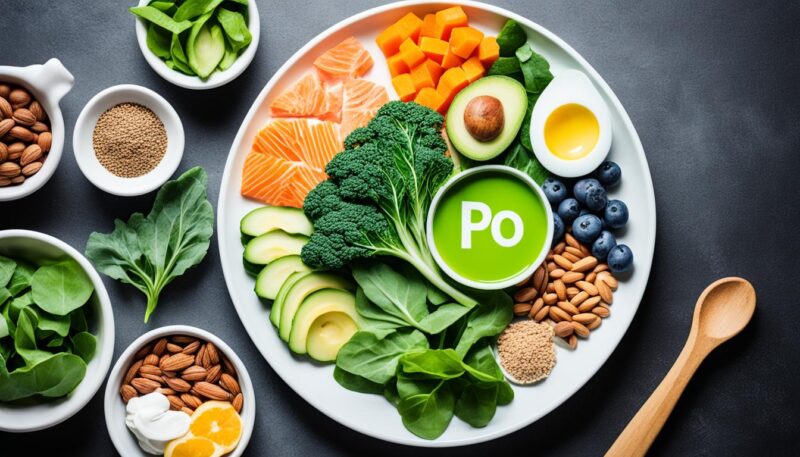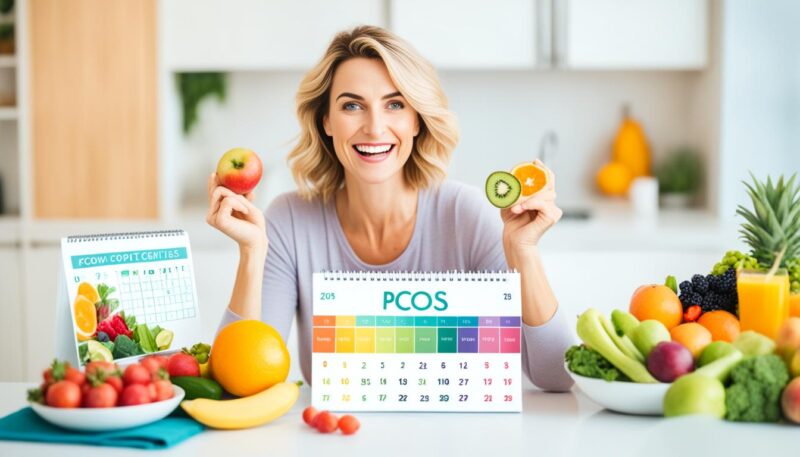PCOS is tough to handle, and I’ve faced its challenges myself. For a long time, I struggled with its symptoms. These included hard-to-lose weight, constant tiredness, and mood swings. It felt like an endless fight, till I found help in PCOS diet supplements.
These supplements changed my life, helping me control my hormones and find my body’s balance. I want to pass on this wisdom to you. This way, you won’t have to face the same hardships I did.
I’ll lead you to the best PCOS diet supplements that science has backed. These aids are proven to handle the hormone issues linked with PCOS. From natural options to helps in losing weight, aids for fertility, and herbal choices, I’ve covered it all. This guide aims to simplify your search through PCOS supplements.
Key Takeaways:
- PCOS diet supplements can help manage hormonal imbalances associated with PCOS.
- There are various types of PCOS diet supplements available, including natural remedies, weight loss aids, fertility boosters, herbal supplements, and more.
- Choosing quality PCOS supplements is essential, so look for certifications from reputable organizations.
- Inositol, vitamin D, B vitamins, omega-3 fatty acids, magnesium, and adaptogens are some of the most effective PCOS diet supplements.
- It is important to personalize your PCOS supplement regimen and consult with a healthcare professional for specific recommendations.
Understanding PCOS and Its Impact on Health
PCOS, or polycystic ovarian syndrome, is a widespread hormonal issue. It affects 6-12% of women in the United States. They may face ovarian cysts, irregular periods, acne, and more.
Women with PCOS also have a higher chance of serious health problems. These include diabetes and heart disease. They might also deal with high blood pressure and stroke risks.
Supplements and a good diet can help manage PCOS symptoms. They target the hormonal imbalance behind the issue. This approach can improve overall health and well-being.
Choosing Quality PCOS Supplements
Finding the right PCOS supplements is key for managing your condition well. However, there are so many options it can feel hard to choose. This is where certifications are important.
The National Sanitation Foundation (NSF) and the United States Pharmacopeial Convention (USP) give out certifications for dietary supplements. Their marks mean the products have been checked for quality and safety.
The NSF is a group that independently tests and certifies many products, including PCOS supplements. They make sure the products are clean and meet high standards. Choosing supplements with their certification adds to your trust in them.
- When looking at PCOS supplements, see if they have the NSF certification. This mark shows they’ve been through detailed testing.
- Choosing NSF certified supplements means you’re picking a quality product. It gives you peace of mind about its standards.
The USP also ensures dietary supplements are top quality. Their USP Verified Mark proves that a supplement is trustworthy and meets their standards.
Remember, the U.S. Food and Drug Administration (FDA) doesn’t pre-test or approve supplements for sale. This is why relying on NSF and USP certifications is important. It guarantees your PCOS supplements are safe and work as intended.
Always check for NSF or USP certifications when adding supplements to your PCOS care routine. This way, you know the supplements you use are both safe and effective.
For those looking for more information on PCOS supplements, this study on PubMed is a helpful read. It offers insights into how various supplements can help with PCOS management.

Inositol for Insulin Control
Inositol is a B-vitamin that’s great for women with PCOS. It helps control insulin. This is important for their health, as high insulin levels can lead to issues like PCOS and metabolic conditions.
Studies show that inositol can lower insulin. When insulin is under control, it balances hormones. This boosts overall health.
Inositol also decreases testosterone. It makes androgen profiles better. This can help with problems like acne in PCOS.
It’s best to take inositol when not eating. This helps your body use it better. Make sure to ask your doctor about the right dose and when to take it.
Key Benefits of Inositol for PCOS:
- Helps control insulin levels
- Improves blood sugar levels
- Lowers testosterone levels
- Improves androgen profiles
- Aids in managing acne
Inositol is key for PCOS and insulin. Adding it to your plan can improve how your hormones work. This leads to better health and well-being.
Vitamin D for PCOS Management
Vitamin D is vital for good health. It’s especially important for women with PCOS. Studies show taking vitamin D can make periods more regular and improve chances of getting pregnant. It also helps to keep blood sugar levels stable and makes insulin work better.
Many women with PCOS don’t get enough vitamin D. So, adding vitamin D supplements to your diet plan is smart. It’s best to take vitamin D with foods that have a lot of fats. This helps your body absorb it better.
Getting your vitamin D levels checked is a good idea. A healthcare professional can tell you how much vitamin D you may need. They will say what supplement dose is best for you based on your test results.

Adding vitamin D can help a lot with PCOS. It can make you healthier overall. You might see improvements in getting pregnant, having regular periods, and managing blood sugar and insulin.
B Vitamins for Hormone Regulation
B vitamins, especially B6 and B12, are key to controlling hormones. They keep hormonal levels steady. For those struggling with PMS, these vitamins can ease symptoms. They also work well for women with PCOS by fighting insulin resistance.
Finding B vitamins is easy. You can get them from foods like fish, poultry, potatoes, and fruits. Adding these to your diet feeds your body the B’s it needs naturally.
You may also consider B vitamin supplements. They offer a strong dose to meet your daily needs. But, be careful not to take too much B6. Too high a dose can harm nerves.
Whether from food or a pill, B vitamins are important for hormone health. Always look to control hormones and manage PMS. It’s smart to talk to your doctor about the best choice for you.
Dietary Sources of B Vitamins:
- Fish
- Poultry
- Potatoes
- Fruits

Key Takeaways:
- B6 and B12 are great for hormones and easing PMS.
- Eat foods like fish and fruits to help keep hormones balanced.
- Supplements are an option but watch out for too much B6.
- Talk to a doctor for advice tailored to you.
Omega-3 Fatty Acids for Inflammation Reduction
Omega-3 fatty acids are important fats for our health. They are in fish oil, flaxseeds, and chia seeds. These fats fight against inflammation. Using them in your diet or as supplements can cut down on inflammation.
Inflammation helps us heal from injuries and fights infections. But, too much inflammation is not good. It can lead to issues like PMS and endometriosis pain. Omega-3 fats can help with these problems.
If you’re dealing with PMS, omega-3 fats might help. They can make you feel better by lessening the body’s inflammation. Try eating fish that are rich in omega-3s or add flaxseeds and chia seeds to your meals. You can also take supplements with EPA and DHA, the main omega-3 types.
Omega-3 fats could also help with endometriosis pain. This is when tissue grows outside the uterus, causing a lot of pain. Omega-3s can reduce how much you hurt and cut down on inflammation.
Choosing the right omega-3 supplements is key. Pick ones from trusted brands. They should be pure and strong, meeting high-quality standards. Talk to your doctor to find the best dose for you.

Magnesium for Insulin Resistance
Magnesium is key in dealing with insulin resistance in women with PCOS. It helps handle glucose and keeps insulin at the right levels. For those facing insulin issues, keeping magnesium levels up is key.
When cells don’t react much to insulin, blood sugar rises. This can lead to type 2 diabetes and make PCOS signs worse. Insulin resistance can make it hard to stay at a healthy weight, cause irregular periods, and mess with hormones.
Studies link low magnesium with insulin resistance problems. Adding magnesium might ease high blood sugar and weight issues linked to insulin resistance.
Magnesium could aid those with PCOS who get menstrual migraines, too. These are severe headaches tied to the menstrual cycle, probably due to hormone shifts. Magnesium might make these migraines happen less often and be less painful.
Try to eat more magnesium-rich foods like green leafy veggies, nuts, seeds, and whole grains. Or, you can take magnesium supplements. Adults should aim for 310-420 mg of magnesium daily, says the National Institutes of Health. But, always talk to a doctor before making big diet changes or starting supplements.

So, magnesium is great for battling insulin resistance in PCOS women. It improves how your body uses glucose and insulin. This can ease symptoms of insulin resistance and improve metabolic health. Plus, it might help with menstrual migraines. Whether in food or pills, getting enough magnesium is essential for managing PCOS well.
Adaptogens for Stress Management
Adaptogens come from plants and can reduce stress. They help bring our bodies back into balance. These substances are known to help with symptoms like hormone issues from stress.
Ashwagandha is one adaptogen that’s been well studied. It’s an ancient herb from Ayurvedic medicine. This herb helps reduce stress and lower cortisol, a harmful stress hormone.
Ashwagandha works by lowering cortisol levels. This can help with hormone problems related to stress, like PMS and menopause. However, more research is needed in this area.
Before adding adaptogens to your routine, talk to a healthcare professional. They can give advice tailored to you. This ensures you use adaptogens safely and effectively.
Remember, stress management should be holistic. Healthy habits like exercise, good food, sleep, and fun activities are key. They support the work of adaptogens.
Using Adaptogens Safely
Choosing a good brand of adaptogens is crucial. Check for quality and purity to make sure they work well and are safe. Look for respected certifications when buying.
Adaptogens are just one part of managing stress. It’s vital to tackle the root causes of stress too. Focus on a balanced and healthy life.
Always talk to a healthcare expert before starting something new. A naturopathic doctor or an integrative medicine practitioner can help. They’ll advise the best use of adaptogens for your health.

Understanding Vitamin and Supplement Safety
Adding vitamins and supplements to your health routine is great. But, safety is key. Always talk to a doctor before trying new ones, especially if you’re taking medicines. Certain supplements might not mix well with meds and could cause issues.
Your doctor knows your health best and can help you pick the right supplements. With their advice, you’ll know what’s safe for you to use. This approach lessens the risk of any bad effects from drug interactions.
It’s also important to not guess with how much to take. Stick to the amount listed on the product. More is not better. It could even be harmful. So, always follow the dosage instructions.
Reading the labels well is crucial for safety. Too much of a supplement won’t up its benefits. It could, in fact, hurt you. Sticking to the right amount helps you stay safe and get the most from your nutrients.
By working closely with your doctor and staying within the proper dosage, using these supplements can be a smart move. Safety first means you can enjoy the potential benefits without worry.
For full details on how to stay safe with vitamins and supplements, check out the National Center for Biotechnology Information. It offers the latest insights and expert advice to help you understand better.
Your health is priceless. Always put safety first and get advice from those who know best. This way, you’ll make choices that are smart for your health.

Personalized Approach to PCOS Supplementation
PCOS is a complex health issue. Supplements work differently for each person. It’s vital to choose supplements that fit your unique needs. This ensures you get the right support for your PCOS journey.
Talking to a PCOS specialist can help a lot. They will consider your medical history and symptoms. They’ll suggest supplements that are best for you. This personalized advice can really make a difference in your health.
Remember, managing PCOS is more than taking supplements. Eating well, exercising, and managing stress are key too. A complete strategy is needed to fight PCOS effectively.
Pairing custom supplements with healthy habits is powerful. Doing so can enhance your health and lessen PCOS symptoms. A holistic strategy treats the whole person, not just the PCOS symptoms.
Why a Personalized Approach Matters
Everyone’s body is different. What helps one person with PCOS might not help another. A tailored approach lets you focus on what your body needs most.
Targeting specific health issues is key. Working with a healthcare pro can help you do this. They can identify what your body is lacking and recommend the right supplements.
Getting ongoing advice is also important. Your healthcare provider can monitor your progress. They’ll make changes to your supplement plan as needed. This keeps your treatment effective over time.
Embracing Individual Needs and Goals
People with PCOS have different health goals. Some want to control insulin levels, and others seek hormonal balance. A personalized approach helps you reach your unique health goals.
Your doctor can help pick the best supplements for you. They may suggest supplements that aid with insulin, hormones, or fertility. This ensures your supplement plan supports what you care about most.
Managing PCOS means focusing on what works for you. By embracing your health goals and working closely with a healthcare expert, you can create a supplement plan tailored to your needs.

Conclusion
PCOS diet supplements help balance hormones and ease PCOS symptoms. They work best when used with a healthy diet, lifestyle changes, and personalized supplements. This approach offers relief from hormone issues for women with PCOS.
Inositol, vitamin D, B vitamins, and more supplements can help with insulin, hormone control, and stress. They’re good for symptoms like hair loss, weight gain, and acne. Together, they make a powerful team against PCOS problems.
It’s vital to talk to a healthcare provider before starting any supplements. They can recommend the right ones for you and advise on proper doses. Remember, a balanced diet and exercise are also key for managing PCOS.
To dive deeper into PCOS supplement research, check out this study. Be patient with your PCOS management. With a mix of holistic care and the right supplements, you can feel better and take back control of your health.














